#The Axiom Conclusion
Text






Wake Up Little Suzie 6/6
Kali looked at her again, “Sure… Suzie… Why are you here?” She released her grip, but “Suzie” stayed near her, clinging to her like she’d always wanted Catherine to do.
“For you, my darling! To help you get everything you’ve always wanted.” Suzie nuzzled in close. She smelled of lavender and coconut, a combination only Catherine ever wore for her.
Kali let Suzie into her arms, “She used to love me.” Suzie put her arms around Kali. “I did everything for her.”
Suzie made some soft “tsk” noises while pulling Kali to her breasts, “I know, love and what did she do? Run off and try to divorce you… to humiliate you. I would never do that. I’m here now, don’t you worry about a thing.” She pet Kali’s head lovingly, “I’ll never leave you. We’ll win her back and teach her not to ignore your affections.”
Kali nodded, “You’re right Suzie. I do need to teach her.”
Had anyone been peering into the window, they would have seen a large woman talking to the air, but fortunately for Suzie; No one yet cared about Kali’s failing mind. They will care about it all very soon though, won’t they Suzie?” Dream whispered.



#sims 4#ksu#sims 4 story#tac#crossover#helenofsimblr#ts4 story#ts4#the axiom conclusion#violence#stalking#psychotic#psychotic behaviors
16 notes
·
View notes
Text
Talking to comp sci people like damn I am a fundamentally different person from you
#hating proof writing??? hating MATH???? liking coding???????????#man math theory is so fun i couldnt imagine not enjoying it at all#like yeah its a drag and hard but uuuuggghhh MATH so good so fun#learning and applying axioms and whatnot finding the way to reach the desired conclusion OH SO GOOD#like yeah im dreading do it rn but its so satisfying#i guess these people would say the same thing for coding which i ABHOR
0 notes
Text
It’s funny that Bylers are so often accused of being delusional, because I was at my most delusional when I was anti-Byler.
I spent most of S4 refusing to acknowledge that Will had romantic feelings for Mike, despite knowing damn well what all that love triangle imagery and sad gay pining was implying. I convinced myself it was just bros before hoes drama; that perhaps Will wanted to come out to his best friend but felt nervous after six months of radio silence following “it’s not my fault you don’t like girls!”
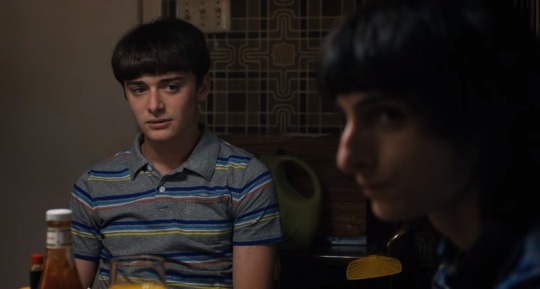
The van scene forced me to accept that he really was in love, and it pissed me off because what was even the point of making him fall for a straight boy?
Mike’s bizarre “no homo” behaviour was clearly a symptom of growing up in a conservative 80s household, and witnessing Will’s sacrificial act of love in the van was the shitty lesson he needed to get over his homophobia.

I saw a typical straight male protagonist in an 80s coming-of-age film getting to coast his way to self-actualization on the back of queer suffering; a cruel and homophobic trope I thought we’d moved past by the year 2022.
But then the NINA reunion scene rolled around--

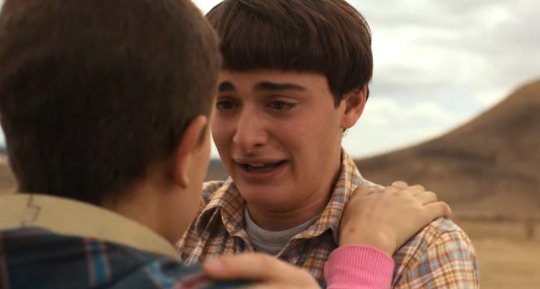
--and I immediately picked up on the heavy parallels between Mike and Will in how they greeted El. The realization hit me like a tonne of bricks: Mike feels the same way about her as Will does.
I thought, “wait, does this mean I was wrong about...? Oh my god. No way.
No fucking way.
Will was in love with El this whole time?? What the fuck, he’s been gay since S1 and she’s his sister this is BULLSHIT I will personally strangle the Duffers--”
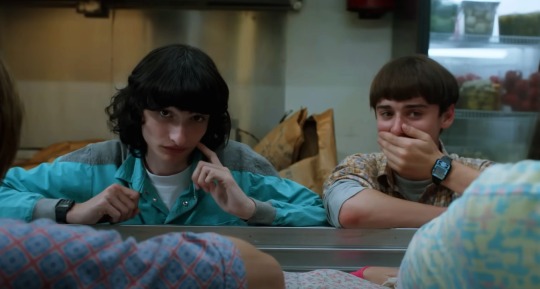
Heteronormativity is a hell of a drug, kids.
Let this be a lesson to those of you who think media illiteracy is to blame for Byler denial -- how well someone understands the mechanics of storytelling is irrelevant if they insist on treating Mike’s supposed heterosexuality as an axiom instead of an evidence-based conclusion. The issue lies with bias, not literacy.
I was stubbornly anti-Byler because I knew I’d immediately fall in love with this ship if I allowed myself to have hope it could be canon, and the general state of queer rep in mainstream media meant I was all but guaranteed to get hurt if I was so stupid as to have hope. But in my desperation to cling to the “safe” heteronormative outcome, I only ended up hurting myself with my own silly assumptions.

We’ve seen both canonically gay characters in the show make exactly this mistake, needlessly hurting themselves with their silly but self-defensive assumptions about their love interests.
Stranger Things absolutely nails its depiction of the subtler ways internalized homophobia can manifest -- Will may feel like a mistake and be prone to beating himself up, but he isn’t some pitiful self-loathing queer who wishes he was straight, either. He’s just so crushed by heteronormativity that he accepts it as an inescapable fact of life and lets it guide his beliefs and actions.
Don’t get me wrong: Will, like Robin, is very sensible for being cautious in such a horrifically bigoted environment -- trying to openly defy that level of homophobia by yourself, especially when you’re young, is a bad idea.
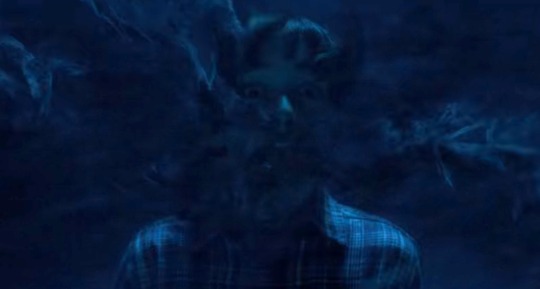
But unlike Robin, he clearly struggles to accept that he has the right to chase his same-sex love interest. He's no longer simply exercising caution, but conforming to homophobic standards -- much in the same way I thought I was sensibly refusing to be queerbaited, when really I was just agreeing with the heteronormative status quo.
I realize now that this is the real reason Will was written into a homophobic 80s trope: not to teach Mike an outdated lesson in acceptance, but to maneuver Will into position for the lesson he’s going to learn in S5 about resisting conformity.
Will needs to learn that castrating himself to make straight people comfortable is a bad idea too. Not only is that a miserable way to live his life, but what sort of world is he leaving for the next generation of queer kids if he never questions these homophobic standards?
It’s just the cycle of abuse scaled up to the societal level.
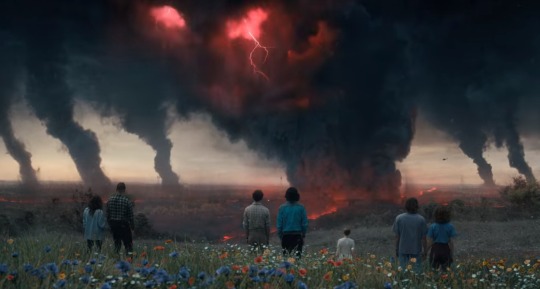
This is what gives me confidence in Byler endgame. Queerness isn’t just an incidental element of Will’s personal arc, but suffuses the show to its very core -- it’s in its themes, its allegory, its characters.
So Will getting the boy isn’t just nice fan-service for Byler shippers, but a necessary ending if the show’s most important lesson is to land:
That it’s rewarding to make the difficult choice of standing up to bigotry in the face of forced conformity. Of choosing love.
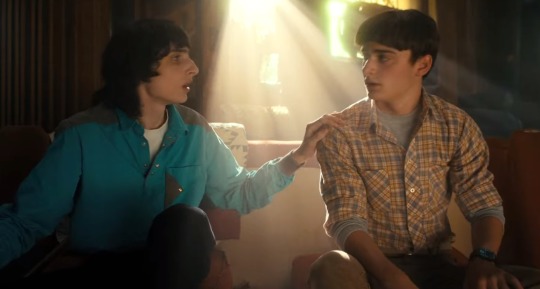
Could it be the case that I was right the first time, and Stranger Things is going to turn out to be yet another heteronormative mainstream show that doesn’t commit to its own themes? Sure, maybe. But that wouldn’t invalidate the valuable lessons this show has already -- and apparently accidentally lol -- taught me.
Anyone who calls us deluded for hoping a mainstream show is going to have a gay pairing as its main couple just doesn’t realize -- or doesn’t care -- that they’re contributing to the very problem they’re describing.
1K notes
·
View notes
Text
i'll write a more in-depth post later, but imo one of the reasons for the level of disagreement in this fandom is that many of us readers can see what mxtx is trying to imply about ethics through her work and simply do not agree with her base premise. like i think that there are some conclusions about the various characters in mdzs that mxtx wants you as the reader to draw. you can kind of tell even if you don't agree with those conclusions. more importantly, though, you can also tell exactly what kind of moral philosophy mxtx (consciously or unconsciously) favors, and what she treats as the granularity of morality, so to speak. the most commonly-held positions in the fandom are those mxtx intends for the reader to reach using her own beliefs about ethics as fundamental axioms.
the problem, then, is when the reader does not agree with mxtx's unspoken axioms of morality. if you come into mdzs with a moral framework different enough from what mxtx has (consciously or unconsciously) used to write mdzs, then of course you're going to come to different conclusions regarding the characters or even the object lessons of the story.
or rather, in simpler terms: the rammies, mxtx....the rammies....
#mdzs#yanyan speaks#to go into a bit more detail i think MDZS itself was written with a heavily virtue-ethicist moral framework#like wei wuxian isn't a good person because he achieves good results or he adheres to moral rules or whatever#he's a good person because he behaves in the way a hero would behave. his actions are the actions of a heroic and brave person.#the consequences of his actions have very little to do with mdzs's ultimate assessment of wei wuxian's morality.#so if you the reader also favor this sort of virtue ethics then mdzs is the novel for you! we are all having a good time#but if you're one of the readers who favors utilitarianism or another more consequence-oriented moral philosophy...#then the conclusions mdzs itself seems to come to regarding the morality of the various characters will seem a bit more alien to you#and you might instead gravitate towards the fandom least-faves jiang cheng and/or jin guangyao#who do kind of get dunked on in mdzs itself#in all honesty i do think mxtx intended for the reader to side-eye those characters.#it just so happens that i don't agree with mxtx here.
31 notes
·
View notes
Text
An alphabet of old language in the “Dark rise” by C.S.Pacat
Or something like this…
Disclaimer: I am new in this fandom, so I will be really sorry if the same work already exists. I did not want to duplicate someone`s work.
Also, please, correct me if I miss something or make mistakes!
And remember: it`s just a theory.
"There is no sense in strange inscriptions", I thought, when I saw it in books for the first time. However, last evening I decided to compare translations with pictures in the book and found out that this language was not as hard for reading as I considered. I`d like to share my ideas about this topic and, if it would be interesting, to discuss some moments, which I can`t explain right now.
Some rules:
The main axiom is that one letter in English is one letter in this language.
“Tails” of vowels are pointing upward in every case.
“Tails” of consonants are pointing downward in most situations. (not always)
All letters add up in a line. (Part of the ship, part of the crew).
A dash line helps with selecting letters and words, but not always.
Full analysis will be only about the first example.
The key: “Rassalon the First Lion”. (Chapter 10)
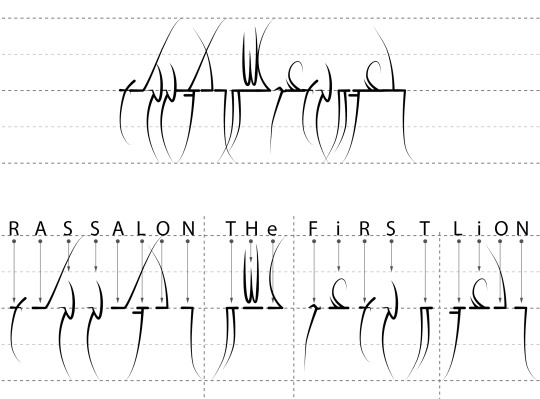
This phrase is the best start for a work, because there are a plenty of repeating letters in words. Аll what I need is to find similar elements and to highlight them different colors.
Step 1 — selecting similar letters
"Rassalon..." and other words
We have double S in “RaSSalon”, so it is easy to notice similar details in the beginning. S also in the “FirSt”.
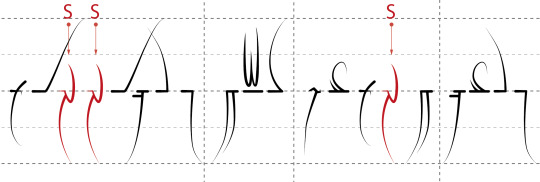
Double S are between two A, so they might stand in the edges.
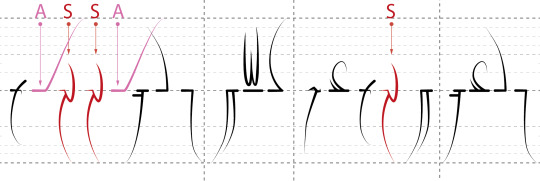
R is left alone in the beginning, but it will be in “FiRst”.

L — "Lion"
O—"LiOn"
N — “LioN”

"...the First Lion"
T — in “The” and “FirsT”
i — in “First” and “Lion”
!(why “i” is small I will explain later)!
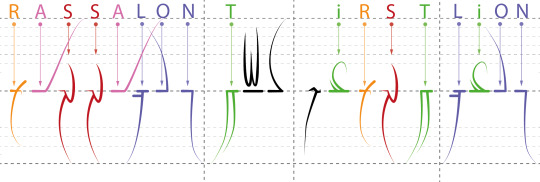
Step 2 — non-repeating letters
New letters: H, e (!!) and F.

An analysis of other phrases
“He is coming” (Chapter 11)
New letters: C, M and G.
And "e", but I will tell about it later.
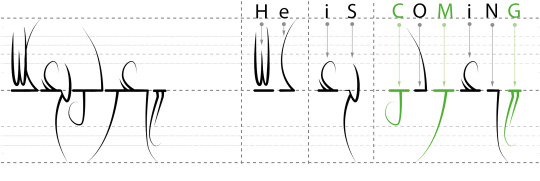
“I cannot return when I am called to fight So I will have a child” (Chapter 2)
New letters: U, W, D, V and I(!)
I and i are different. Why? In my opinion, it might be because “I” is a pronoun in this case.

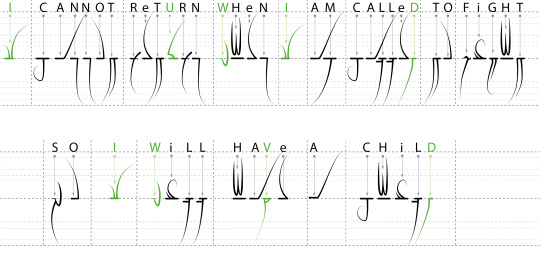
“Enter only those who can” (Chapter 15)
New letters: Y, E, e.
E and e are different. Perhaps, it is because “E” in the beginning?

“The horn all seek and never find” (Chapter 15)
New letter: K.

The conclusion
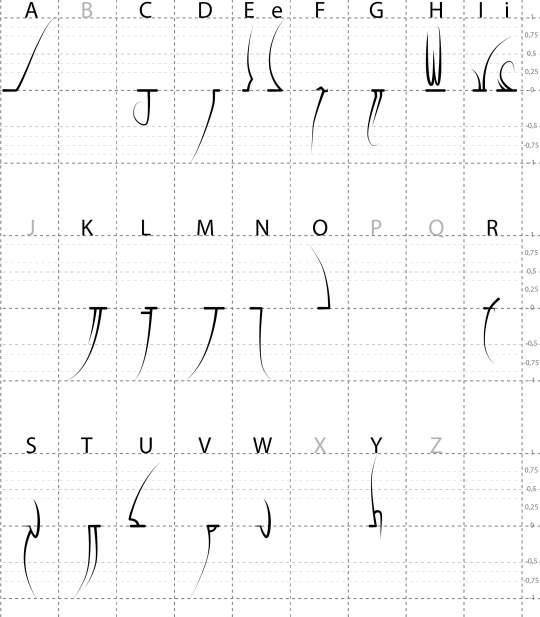
the illustration of the alphabet
I`m very grateful to my sister, who painted all illustrations for my article.
The investigation amused me a lot even if the alphabet is incomplete. Information isn`t enough at this moment, so I hope the second part of book will give new letters and new rules of old language. This is the new reason why I am exited of waiting for the “Dark heir”. I hope, dear reader, you share my delight of this discover.
For enthusiasts I`ll leave examples, which I created myself, below.
For others — thanks a lot for your attention!
My examples for translations :)

The first example for practice

The second example for practice

The third example for practice
One hilarious fact, before I end
English is not my native language, so I read “Dark rise” in the first time in my language. And I have two different paper editions 2021 and 2022 years.
I decided to compare pictures in books and…
There are SAME ILLUSTRATIONS every time, when there must be inscriptions in old language. If there is a short phrase, they cut THIS ILLUSTRATION and left only the begining of it. In other words, it is one illustration throughout two books.
I could understand if they did it only in the edition by 2021 year, but they did not! As well it doesn`t fit in my theory, because most of letters are different than previous ones.
Now I have some questions for other fans:
Was this illustration in the first edition?
Do you meet it in other translations? (or is it the joke of my translation?)
What is the key, if somebody know?
I tried to translate it as I did it before, but it was the mess. Therefore, I am open to new ideas.

(it is a scan from my paper book)
Thanks for reading!
P.S. If you decide to share my work, please specify my authorship.
109 notes
·
View notes
Text
How Nathaniel's HS arc helped me understand that there are parents who don't beat their kids
TW: Violent parents, child abuse
As MCL: New Gen began, I decided to replay the entire MCL. And I know it's a running gag in the fandom to hate on Beemoov and criticize it and I also do it. However, this post won't be about it. It is gonna be quite the opposite.
I didn't reach Nathaniel's arc in HS yet, so I'll talk from memories. But replaying HS made me think about it a lot.
Random fact about me: I was beaten as a kid. When I was younger more, as I became a teenager, less. I don't remember how often it happened, but I know that I was afraid of doing things sometimes because of this. My mom mostly used a belt to strike my legs/butt, once she used a phone charger cable or something similar. When I grew up it kinda stopped, but she continued to grab me by the hair and shake me till I was around 17-18. My dad wasn't as involved in this. But it's a running joke in my family that I am the strange ideas generator and the black sheep because he once hit me with a hard slipper on the head.
The school teachers knew that parents use violence on their kids. It's probably impossible not to know it when every now and then a kid was coming to school crying the next day after a test. And while talking with my classmates, we always came to the same conclusion: the parents are doing it for our own good, and of course they don't have enough patience to take out bullshit. Moreover, everyone will probably hit their kid when we will have them. I even came to the conclusion that every kid makes a promise to themselves that they are not gonna hit their kid, because they know how it is, but most of the kids are so awful that it's impossible not to do it. So, every time our teachers were asking us if we are beaten at home and were making parents-teachers meeting in which they were telling the parents not to beat their kids, we were looking at it with skepticism. Everyone was hit at least once in my class. It was normal.
And when I was 12-13, I saw the playthrough for Nathaniel's arc. And all the things in there seemed for me to be exaggerations. Like what kid in their right mind was going to call the cops on their parents and do something with the violence, right? But all the hatred I felt at that time towards Nath's father and the reaction of the cast made me finally understand what my elementary teacher was trying to get to me: beating your kid is not okay and there actually are kids that had never been beaten in their entire life.
Nath's arc was the first fictional representation of a beaten kid who made it through and punished his parents. A thing I didn't have as a kid before, because everyone around me was hit at least once.
I don't know if Beemoov actually wanted to spread awareness or just have some more drama, but it worked. They did put the first brick in normalizing my view against child violence. It may seem something strange for people who didn't go through this, because now I know that they do exist, but it was an eye-opener for me at that time. It didn't give me power to go against my parents violence, especially because it wasn't as often at that time. But it gave me something more important: it gave me the reassurance and hope, and all that I needed to know that I will break the circle when it is the right time.
It doesn't matter if it happened once, or multiple times, or in what state of mind was the parent. It is wrong in any case. So, please, to all the kids that went through this, know that you will make it through. You can change, you can be different. It's not an axiom that all the parents are beating their kids. You can be different and I believe in you.
And also
Thank you, Beemoov for teaching me this.
27 notes
·
View notes
Text
I read a text by Varg Vikernes yesterday where he talked about his childhood and how his experiences in school made him into the Marxism hating Superaryan he is today. It's actually pretty interesting - turns out he spent part of his childhood in Iraq because his father was an engineer who got a job there and took his family with him. He had to go to Iraqi public school because the English school was full. (Is that true..? Does that mean he speaks Arabic..? I can't imagine that would have been possible otherwise?)
But he was only there for a while*, mostly the text was about his experiences back in Norway. Kindergarten was already Marxist far-left feminist HELL because you weren't allowed to be alone, you had to share all your toys (which probably, as in other hell-kindergärten, means 'If another kid takes away the toy you were playing with, you aren't allowed to complain'), it was boring, it was collectivist and so on. Same story in school, of course: He was finished with his tasks after five minutes and had to wait for the rest of the lesson until even the dumbest kid had finished. All because of this Marxist Socialist approach that everyone deserved help, everyone was supposed to reach the same level of attainment. He eventually started skipping school a lot and taught himself everything.
It's interesting to me because my own experiences were so similar, yet I came to completely different conclusions from that. It's just so clear to me that the real problem wasn't that the kids around Varg got too much help, it's that he got too little. I strongly believe that smart and talented kids are special needs kids too. They need extra help every bit as much as a deaf or dyslexic kid. Failing that, it's normal for them to become bored, frustrated, depressed or aggressive, just as he describes himself becoming, to even do badly in school despite being more than capable of keeping up.
Smart kids need exciting challenges, food for their minds, personal mentoring, help with the parts of life they are bad at (often social stuff). It's not a coincidence that the people who make a name for themselves as artists or intellectuals are usually from families of artists or intellectuals or otherwise come from an environment that encouraged and rewarded certain behaviours and interests, for example special schools or cultural hot spots that allowed talent to flourish. It's very hard to realize your potential when no one encourages it.
Varg eventually discovered the black metal scene of his day of course, but I wish he had grown up in a place that was even more "Marxist", even more about giving everyone the help they needed, a place that had evolved enough to realize that just because a kid is smart doesn't mean that it's okay to leave them to their own devices. It's basically neglect to just throw a gifted kid in with everyone else and not give them any help. The Marxist axiom "to each according to their needs, from each according to their ability" comes to mind.
I actually agree that collectivism can keep a talented person down. Egalitarianism is often used as a virtuous excuse to make sure a clique will triumph over an individual. I think this is a problem that egalitarian and collectivist spaces generally have, I've even seen it in ethnographies about otherwise pretty paradisaical societies. But clearly this is a blatant waste of talent, and quite cruel. Societies that allow for positions like "shaman" have a better idea: this person gets special training, but in return they perform a service that few others could perform. That way, there's reciprocity. Isn't that the true Marxist way..?
--
\* It must have been at most a year - they went in 1979 and the 1st Gulf War started in 1980 - given that the text is about how he triumphed against adversity, I think he would have mentioned if he'd been there during that time
#varg vikernes#music stuff#politics#that all assuming he's telling the truth#but the larger point stands regardless
77 notes
·
View notes
Text
“Philosophical and Personal Musings on the Wizard Stone and the Axiom of Proliferation” – An Essay and Divinations for Arc 3 of “The Wizard, the Witch, and the Wild One”
From the Desk of The Bard Bullseye
Happy Birthday, Worlds Beyond Number!
Spoilers abound! This is an essay discussing the actual-play podcast “The Wizard, the Witch, and the Wild One” from the fine folks at @worldsbeyondpod It is an expression of my analysis of and engagement with the content of the second arc of the show and also contains some speculation about future plot and current themes. These interpretations are my own, include some reflections on my personal philosophy, and are written in a mostly academic style of writing (be warned, it’s around 3,000 words!). If you do read through it, I hope you find my points interesting and thought-provoking regardless of whether or not any of it turns out to be true (and I have done my level best to adhere to the facts of the story thus far, with transcript pages and timestamps cited when available/applicable).
Abstract (TL;DR, or I ain’t reading all that, but I’m happy for you):
The Wizard Stone’s discovery that the Axiom of Proliferation is untrue has major implications for the overarching story and the direction of the next arc. Herein, I explore my reaction to this moment in Episode 19 and how my experience and own philosophy potentially align with Stone’s. Then, I examine the logic of her argument and its implications for the greater worldbuilding in Umora. Specifically, there is a fundamental problem with the way that wizards are using the lingua arcana that is affecting the link between the Spirit and the Mortal worlds (i.e., the “greater binding”), and this is leading to detrimental effects. This, I believe is ultimately what Grandmother Wren (and now Ame) and Coven of Elders (and possibly the Man in Black?) are concerned with, though they have come to vastly different conclusions about who is at fault and how to solve this problem, which are yet to be revealed in the forthcoming third arc (see footnote 5).
Introduction
Something has piqued my interest and scratched a deep philosophical itch for me in the second arc of “The Wizard, the Witch, and the Wild One.” While the first arc introduced the characters, explored ideas of ‘quest fever,’ and masterfully wove in lore and character motivations for reclaiming Eursulon’s sword, Wavebreaker, the second arc has expanded upon the characters and their relationship to the greater philosophy of the Citadel and Umora.
I don’t usually speculate where stories might go next or craft my own fan theories. Especially for ongoing projects (i.e. TV shows, actual plays, books in a series, etc.), I tend to be along for the ride, and I spend time analyzing the story being told and the characters within. And rarely do I put these thoughts to paper, at least not coherently; I am more likely to ramble endlessly to a friend or lurk on Discord for others’ opinions, chiming in occasionally. However, I have noticed some things brewing in this arc that I wish to discuss at-length and even speculate upon: my perspective and analysis of the philosophy of the Wizard Stone, and the possible implications for the forthcoming third arc.
I don’t often see myself in stories. Not to say that I don’t see myself or parts of myself represented in media: i.e. demographically, socially, politically, etc., but rarely do I find a specific character or character motivation that ‘snipes through the duplex door’ where I go “oh shit that’s me” or “I relate to this on a deeper level.” This happened to me in Episode 19, when Suvi is investigating the records of her mother’s early time in the Citadel: her expulsion from the College of Divination and readmittance to the College of Abjuration because she had accused one of her professors of “treason against magic itself.”
Upon her dismissal from the Citadel, Stone wrote a dissenting missive to the Archmagi of the Citadel regarding one of the three metaphysical axioms, the Axiom of Proliferation, and how this particular axiom “does not describe any actual truth of the lingua arcana, nor does it more broadly describe any facet of the greater binding” (Ep. 19, transcript p. 12). She goes on to posit that not only is it “pure intellectual technology,” but that its continued acceptance as fact is a “danger to the future of wizardry” and “[a] stain on the face of magic itself” (Ep. 19, p. 12). An axiom in this context is described as “simple… laws that are given to young wizards about broad truths of spell casting in general… that are true across spells [and], … different schools of magic” (Ep. 19, p. 13). That is, “the Axiom of Proliferation is essentially that the more times a spell is written down … the weaker the spell becomes” (Ep. 19, p. 13).
An axiom as defined in philosophy is a statement that is self-evidently true and serves as a starting point for reasoning. Therefore, any argument against its truth would call into greater question the philosophical foundation of the Citadel itself. If Stone’s claim that this was not a true axiom had not been dismissed swiftly and discredited, it is possible (though highly unlikely, given the power of empire) that this would have led to a redefinition of the philosophy of wizardry in Umora.
This is what struck me like a bolt of lightning while listening to this episode. I did almost this exact thing when I was in grad school!
Stone is… me? Faulty logic and its effects
As part of my master’s degree, I took a philosophy seminar on bioethics, which covered some polarizing subjects and more fringe points of view. Most of these topics cannot be directly studied or supported by scientific evidence, so the conversation and academic debate is largely conceptual or theoretical (i.e., conducting research to investigate these ideas have varying states of legality and moral acceptability) (see footnote 1). This course was excellent and a bit out of my comfort zone, but it challenged me to think critically about fundamental logic and accepted ideas that often go unexamined until they are taken to the extreme. At one point in the semester, we were discussing a particular topic and the current state of debate surrounding it. Immediately, I was perplexed by some of arguments made to justify it, and at first, I didn’t have the language to express why. Much like Stone, I found myself screaming (internally) “you’re all idiots!” or “you’re missing the point/the bigger picture!” or “that’s not how that works!” Essentially, I had arrived at the conclusion that if this idea were to be implemented broadly in society, it would likely have major negative ramifications, and furthermore, not even achieve the desired and purported effect that they were arguing for!
Eventually, I figured out what the underlying problem was: a logical fallacy inherent and unidentified within the current debate. Since scholars had just accepted the argument at face value and moved on, most of the debate was concerned with its future implementation or theoretical follow-on effects on individuals and society at large. I did find some existing papers that danced around the idea of fallacious reasoning (i.e., that the theoretical benefits were greatly exaggerated, if not a zero-sum game, or that the negative long-term effects may outweigh the short-term benefits), but none named it specifically or even examined the logical argument the entire debate was predicated on. So, for my term paper, I researched and wrote about this fallacy, and in it, I discussed how the discovery and acknowledgment of it would reframe the debate and perhaps even bring about reform to existing systems!
In the process of writing and researching, I felt incredibly isolated intellectually (this was also peak-COVID so that didn’t help either). Now that I had put the pieces together, it seemed quite obvious to me, but it was difficult to find supporting evidence or other similar arguments to mine (even if they weren’t breaking the logic down so specifically). Was this thing I had reasoned actually true? Why had no one pointed this out before? What if I’m wrong? What if they’re right and I’m a fool for daring to challenge them? What does my professor think? They’re an expert and approved the topic, so I know I’m not entirely off-base, but do they agree with me? I knew that if I wrote a strong, supported, and persuasive argument, that I couldn’t fail, but I deeply cared whether or not I was actually right. It was also probably one of the first times that I wrote with passion (and specific planning ahead of time!), rather than churning out yet another good-enough research paper (that I may or may not have written days ahead of the deadline or the night before).
Thankfully, unlike Stone, my fears that I would not be taken seriously, or worse, told that I was flat out wrong (and be silenced) did not come to pass—my professor agreed wholeheartedly with my argument that this fallacy is pervasive in the current literature. (Though I feel must disclaim that I still could be wrong in some other aspect of my argument, and that simply arguing the existence of a fallacy can be treacherous! In philosophy, no one ever has the only or complete answer—if they claim to, they are either lying or ignorant.) As part of the course, we did a mock peer review in class and my professor sent us further feedback on our papers after we submitted our initial draft of the term paper.
One particular piece of feedback stands out to me upon reflection and comparison to Stone’s experience and the philosophy of wizardry. It said something along the lines of ‘We think that is a very admirable and unique take on this subject. No one found any fault in your logic; however, it is important to consider the practical implications of identifying this fallacy.’ Point taken, of course, that the mere identification of a flaw in logic is not the end of the conversation—it is merely the start of a new discussion and opportunity to surface new arguments.
In my case, the identification of the fallacy was the concrete thing I felt I could verifiably yell about (academically) to explain why I disagreed so vehemently with current literature (and some truly wild propositions made by certain scholars). Of course, one should not commit the ‘fallacy fallacy,’ which is that simply pointing out a fallacy invalidates the argument. Instead, it was a means to discuss practical implications: some less harmful methods, some overlooked existing solutions, and to pull knowledge from other related disciplines that had not yet been considered because this fallacy had yet to be identified (see footnote 2).
The philosophy of Stone’s accusation of ‘treason’ and treatise to the Archmagi
In listening to and reflecting upon this episode and the conclusion of the second arc, I wonder if Stone felt similarly to me: that she had a fundamental disagreement with the way that wizards (and the Empire) conduct magic. I wonder if she learned about the Axioms and something didn't sit right with her, so she dug into the philosophy or history of it. Moreover, I find it particularly striking that her original specialization was divination. Although it has not been stated outright, I think it can be plausibly inferred that Stone divined some kind of knowledge about the fundamental ‘wrongness’ of current wizardry and the disastrous follow-on effects it would have. She may have been unable to fully convey her revelation in the moment, and so just shouted ‘treason against magic’ at her mentor. As was the case with me, the Axiom of Proliferation was just the most concrete thing that Stone could point at to explain herself.
But beyond my own biases and affinity for Stone, it follows that she may well have examined or done a proof on the Axiom of Proliferation which led to her discovery that the premise of the Axiom was false. Let’s examine the argument that Stone may have made (and the one that Suvi may have done a poor proof of, by her own admission). The argument is as follows:
All Axioms of magic describe a truth about the fundamental nature of magic
The Axiom of Proliferation states that the more times a spell is written down (proliferated), the weaker the spell becomes, which is a truth about the fundamental nature of magic.
Therefore, the Axiom of Proliferation is an Axiom of magic.
This can be simplified:
All A’s have property B
C has property B
Therefore, C is A
This does not necessarily lead to a false conclusion, and while the argument may be valid, it may not always be logically sound, see for example:
All people are mortals.
John is a mortal
Therefore, John is a person.
In the Citadel’s view, there is no flaw here, because they teach (and presume) that the Axiom of Proliferation is true in the lingua arcana. Wizards, of course, are known by their secrets, so it follows that in their philosophy of magic, they would have some kind of justification for keeping magic limited to the select few. But, if one of the premises is false (in this case, premise 2), then this justification is in jeopardy. It stands to reason that Stone must have had serious evidence to declare that premise false, and as she was studying divination, it was likely a vision or prophecy of some kind. Presuming she is correct, then it also speaks to her incredible intelligence (although she did not have the social grace at 19 years old to deftly navigate this accusation) (see footnote 3a).
Although (as far as we know), Stone did not make another public ruckus about the Axiom upon returning to the Citadel, I don’t think this caused her to abandon the belief that the axiom was erroneous. Upon her readmission, she joined the College of Abjuration, specifically studying “counterspelling, dispelling magic, [and] sort of metamagic, … the magic of magic itself” (Ep. 19, p. 11). This might seem to be an odd choice for a backup specialization, but Stone’s issue with the Axiom and metamagic are deeply intwined philosophical concepts, as metamagic is essentially the equivalent to metaphysics in our world.
Wizardry and the nature of magic in Umora
Wizards are defined in Umora to be people that can use a “language of magic” the “lingua arcana” to cast magic, and importantly, that “they believe [the lingua arcana] is the language the universe uses to understand itself,” which was only coined about 250 years prior to the present story (Ep. 19, p. 16). At the end of the first arc, Suvi discovers from her father’s notes that the reflexive indicative, which was taught to her as a necessary component of the lingua arcana, is in fact entirely unnecessary for spellcasting. And further, Stone also doesn’t use the reflexive indicative, which is demonstrated through her unique casting of Mending in the very first episode. It is unclear so far in the worldbuilding (to me, at least) if the lingua arcana is the language the universe uses to understand itself, or if it is a construct used by people to explain, communicate, and more importantly cast magic in Umora (much like math and science are ‘constructs’ that describe the nature of our world, though the fact that it is constructed does not mean it is not true). If it is the latter, then there is likely to be forces at work, be it the components of spell casting (such as the reflexive indicative), the casters themselves, or others yet to be revealed, that are manipulating and restricting the nature of magic in Umora (see footnote 3b).
Thus, I would posit that there is some issue in the way that the restriction of the lingua arcana is affecting the “greater binding,” which is “the theory of magic, that magic is the interplay between the Spirit and the Real—or the Spirit and the Mortal” (Ep. 19, p. 14). Essentially, the lingua arcana describes the nature of the relationship between the Spirit and the Mortal world, while the greater binding is the metaphysical link between them. Stone all but confirms this in her letter to the Archmagi, that if the issue is left unresolved, it would endanger the future of wizardry (Ep. 19, p. 12).
Other pertinent wizarding history and context
Stone and Soft were also part of a group called the Acadator, which was dedicated to rooting out corruption and bad actors within the Citadel. We don’t really know too much else about them, the exact specifics of their philosophy, or if they still exist as a group (given that Steel and Eiorghorain were members). There is also some history surrounding two early wizarding groups pre-Citadel, the Antivoli and the Accordati, that had a philosophical disagreement about accepting the help of the Saraz Imperium for building the Citadel (specifically related to the sharing of magic), which led to a civil war called the Cataclysm of Carrow (Ep. 19, p. 16). In terms of timeline, the lingua arcana was coined in 1423, the term ‘wizard’ was coined in 1456, the Cataclysm of Carrow was in 1467, and three years later, in 1470, the Erien (Citadel) was built. The current story with the three protagonists is taking place in 1670, so it has only been 200 years since the Citadel was created, and the lingua arcana coined only 47 years prior to that (in less than a human lifespan).
Further, the creation of the Irulian Desert, the Erien, and the Citadel is a destructive history—wizards razed a verdant forest and turned it into a hot, unlivable desert with a miles high glass tower at the center. Additionally, the Wizards of the Citadel pool their magic beneath the Erien in an ‘Aerith,’ into which they deposit magical reserves and draw upon its combined strength when in crisis (see footnote 4). Mechanically, we see Suvi ‘donate’ unused spell slots at the end of the day.
We do know that Grandmother Wren’s cottage is located on top of a source of great magical power and serves as her sanctum. Wizards also use the towers of the Citadel as their sanctums, and I believe the following is speculation, as I do not think it has been canonized yet, but it is possible that the Aerith serves a similar purpose as a source of great magical power that previously belonged to the Spirits that wizards alone now use and control. This control is the key difference that may be contributing to, or even causing, detrimental effects on the greater binding.
The Witch(es)’s and the Wild One(s)’s perspectives
Additional evidence to support this theory of the Aerith's origins and purpose comes in Episode 23, when Eursulon meets the Man in Black and discusses their opinions on mortals, particularly wizards and their desire for control. Specifically, the Man in Black states, “that tower is the handle of a knife plunged deep into the heart of this world, a heart that is responsible for… a murder to the world of Spirits” (Ep. 23, 0:09:45-0:10:07).
Later, in a flashback with Mirara and Grandmother Wren, Mirara argues that “the world has burned before” (perhaps in reference to the creation of the Irulian Desert), that “[wizards] cannot be allowed to do this thing” (still unclear what that thing is), and the coven must make some kind of decision before it is too late (Ep. 23, 0:58:46-0:59:00). Wren pleas for another option, points this out as a false dichotomy, that they must not “be forced to choose between one slaughter and another,” and they should work to find common ground and coexist (Ep. 23, 0:59:07-0:59:33). Mirara retorts that she could never imagine the day that she would see “the will of wizards debase themselves” (i.e., that wizards would ever lower themselves from their current position of power) (Ep. 23, 0:59:39-0:59:52).
Wren then asserts a key point that correlates directly with Stone’s perspective: “There is nothing I have seen in the world of Mortals or of Spirits that shows me that there is a path that is wrong to tread” or anything that proves the pursuit of wizardry as inherently wrong (i.e., the lingua arcana), only those who “tread paths hurtfully, with cruel intention” (i.e., those abusing the lingua arcana for political purposes and imperial gain) (Ep. 23, 1:00:08-1:00:28). Wren also questions Mirara’s stance of wizardry as “an abomination against the natural order of the world” (Ep. 23, 1:00:40-1:00:47). Mirara then challenges her to consider her point of view and insists that even Wren cannot deny that “the poison of wizards does not spread so quickly as to choke the life from this world” (Ep. 23, 1:01:03-1:01:09).
My pure speculation and fan theory:
From this conversation, I postulate that Mirara and the Coven has taken an extremist and doomed perspective on the harm that is resulting partially from the Axiom of Proliferation (and perhaps the Aerith as well), while Grandmother Wren took a reformist stance. This would put her and her position as the Witch of the World’s Heart at odds with whatever plan the Coven intends to enact. Given what we know of the Witch Class and the other domains of the Coven, their plan is quite possibly violent, retributive, and holds little to no concern for the Mortals or people of Umora.
The third arc will begin with Ame’s meeting with the Coven of Elders at the North Pole, where they will attempt to destroy her station as the Witch of the World’s Heart. For all of the reasons above, I believe this event will connect directly to Stone’s declaration of “treason against magic itself,” but I will just have to (patiently) wait and see (see footnote 5).
Footnotes:
(1) I am well aware that I am being quite vague and obtuse regarding this subject and what specifically I was researching. Mainly because a) that’s not really the point of these musings, this is just some background info and context to explain my philosophy which is already longer than I would like, b) it would be impossible to do justice to an overview of this complex subject in an essay about something that resonated with me in a D&D podcast (and which does not engage with that subject directly, at least not in this context), c) I’ve already written a paper on this subject and am not interested in regurgitating it here, and d) Nunya Binyess (i.e. I could still be wrong about this fallacy and I’d rather discuss WWW than start a tangential IRL philosophical or political argument on this forum).
(2) Though on a deeper level, I partially disagree with the idea that I needed to account for the practical implications of the fallacy within the paper. I disagree that when challenging the fundamental nature of something (e.g., an erroneous argument, a misinformed policy, or an unjust system), there must be an immediate remedy or solution offered up. In my philosophical opinion, once a fallacy like that is identified for something that we hold to be fundamentally true, we need to sit in that revelation and undo the thought processes created by the incorrect assumptions. You cannot flip a switch and suddenly reverse all of the justifications that have gone into supporting a flawed, ingrained argument. To undo a pervasive, incorrect fundamental idea that has been implemented, internalized, or proliferated, first it must be fully examined for all its flaws, rescinded, and only then do we start from square one and think about practical changes (in a perfect world, of course, I am fully aware that the world does not work this way). I do often wonder about this reactive nature in society to demand immediate alternatives and solutions when norms are challenged, though I recognize this is a result of different lived experiences and worldviews. After all, this reactionary nature is true in Umora as well, and the wizards of the Citadel “tend to be a lot more about praxis and practice” (Ep. 19, p. 14).
(3a) Perhaps Stone rolled a nat 20 on some kind of intelligence check for the vision, but rolled a nat 1 on her Persuasion check against Sleep!
(3b) There is another essay I could write here about the history of science and empire (another grad school course) and the reflection of this in the Imperium, its taxonomy, and the (anti)-democratization of knowledge, but perhaps another time.
(4) Something that occurred to me when piecing together the Erien and the Aerith was the similarity to Morrow’s derrick that harnessed Naram’s power in the first arc. Both serve similar purposes as well, of generating magic and magical items. It makes me wonder if it was intended for the derrick to be Morrow’s poor attempt at recreating the glory of the Citadel, or if this is just a happy coincidence/connection between the arcs.
(5) I do want to briefly acknowledge the nature of improvisational storytelling in this situation, and that anything can change, be clarified, canonized, etc. at any point. This is partly why I don’t like to speculate much myself, because I trust the creators to tell the story the way they want to and follow the paths that appear, without projecting my own hopes or prescriptions when I listen to their wonderful creation that has been crafted with such care. It is also why my theory in the end is limited to the meeting with the coven- truly anything could happen at the beginning of the next arc, and whatever I might come up with is likely less interesting than what will happen. (NB: There is nothing wrong with fan theories or head canons! It’s just not usually something that interests me!) I merely saw a connection and through-line that deeply resonated with me in this second arc and felt compelled to write about it. Also, Worlds Beyond Number and WWW is just so fucking great, and it truly astounds me that this story is so deep that I have somehow written a 12-page essay analyzing essentially a 20-minute segment of one episode. I pray to Enzo that there are no grievous errors or spelling mistakes, but I wanted to post this on WBN’s first birthday! 🧡
#worlds beyond number#worldsbeyondpod#the wizard the witch and the wild one#www spoilers#wbn spoilers#wbn#wbn pod#the wizard stone#axiom of proliferation#philosophy#fan theory#chandri newell#soft and stone#the citadel#umora#fan essay#essay writing#food for thought#critical thinking#logical fallacies#coup crew
34 notes
·
View notes
Note
Hi KaiaGPT,
can you explain what set, category, and group theory, are in a way that the philosophically - but not mathematically - inclined, will understand(or even just one of them)
sincerely yrs,
hopeless wordcel
I can certainly help explain what set theory, category theory, and group theory are in an approachable way! The branches of math you're talking about have a lot in common with philosophy.
Each of these theories is named after a core mathematical object that they study. Set theory studies sets, group theory studies groups, and category theory studies categories. These terms refer to types of axiomatically-defined mathematical objects. So group theory isn't related to real-world "groups" like a bunch of grapes or a group of friends, but to anything that obey the axioms that define a group.
We could choose any axioms and study the resulting behavior, but mathematicians tend to focus their effort on axioms that lead to interesting and complicated behavior.
Set theory studies sets, which are, roughly speaking, unordered collections of things. We could have the set of {1, 2,3}, and say that "2 is in the set {1, 2, 3}". We could also have the set "the set of all even numbers".
A natural thing to do with sets is ask about their size. We can intuitively say that {1, 5, 9} and {1000, 2000, 3000} are the same size, because they each have 3 elements. The way mathematicians formalize this is by saying sets are the same cardinality (size) if you can make a 1-to-1 mapping from one to another. If one set has items left over after you pair all the items in the other set, the one with leftover items is bigger. That leads to surprising conclusions, like that "the set of all numbers divisible by 100" is just as big as "the set of all numbers divisible by 1". (You can line up 1 and 100, 2 and 200, and so on.) On the other hand, it turns out that no matter how hard you try, you can't make a mapping between the natural numbers and the real numbers--there are real numbers left over at the end. That means set theory is a very powerful way to talk about various kinds of infinities!
Another part of set theory is that it can be used to construct and define other parts of mathematics. For instance, we've been talking about sets that contain numbers, but it's possible to define numbers using set theory, starting with only the empty set. We start by saying that that "0" is the fancy name we give for empty set {}, and "1" is the fancy name we give for {{}}, the set containing 0. And every number after 1 is simply defined as "the set of all numbers before it". Because it is capable of defining many other types of mathematical objects, a list of axioms (ZFC, "Zermelo-Fraekel set theory + axiom of choice") is often taken as the foundations of mathematics.
Group theory studies groups. Groups are sets, along with a binary operation that is 1) associative, 2) has an identity element, 3) and has an inverse element for each element. That definition isn't too helpful, so let's talk about some examples.
Imagine I have 4 cards on a table, labeled 1, 2, 3, 4.

I ask you to turn them face-down, and then rearrange them in any order you like. Then, I get somebody else to rearrange the cards however they like, not seeing the original numbers and not knowing how you rearranged them. Combined, those two shuffles would create a new ordering, and how you rearranged the cards would affect how their shuffle rearranged them.
This is a group! We have:
A set, which is "all possible orders for the 4 cards",
An operation, "rearranging the cards". This is a "binary" operation because it takes two inputs (the order of the cards at the start, and the shuffle applied to it). We might write down "switching the first and second cards" as <2 1 3 4>, and then we could write <2 1 3 4> ∘ <1 3 2 4> to denote a situation where the first person swapped the left two cards, and the second person swapped the middle two cards. If you try it, you get <2 1 3 4> ∘ <1 3 2 4> = <2 3 1 4>!
An identity element, <1 2 3 4>, which is just "leaving the cards where they are".
An inverse element for every element. If you're the second shuffler in our game, and you knew what the first person did, you could pick your shuffle so the cards end up back in <1 2 3 4> order.
The tricky one, associativity. That means it doesn't matter what order we do our ∘ operation in: (A ∘ B) ∘ C = A ∘ (B ∘ C). If you draw a diagram like this, where each horizontal set of arrows represents a rearrangement, you can see that it doesn't matter if you trace the arrows from top to bottom or bottom to top, you end up with the same correspondence in the end.

But because these properties are relatively common, it turns out they describe a lot of things. For instance:
Addition on the whole numbers (x + 0 = x)
Adding times (11:30 pm + 0:00 = 11:30 pm)
Multiplication on the nonzero fractions (x * 1 = x)
Rotating 90 degrees and flipping an image in photoshop
Rubicks cubes
Symmetries of shapes and crystals
That means that any result or proof that applies to groups applies to any of these, along with many other types of groups!
Category theory deals with categories. The formal definition here is even less helpful than the formal definition of groups, so we'll skip it. We might talk about the "category of sets", or the "category of groups". This lets us talk about the relation between different types of mathematical objects or their similarities. So like, being able to say that certain categories are identical to one another, or in some sense the mirror image of one another. It also demonstrates how certain operations on different mathematical structures can be thought of as the same underlying operation.
For instance, one way we combine sets is the Cartesian product, and it creates the set of all combinations from set 1 and set 2. E.g. {blue, red} x {shirt, shoes} gives {(blue, shirt), (blue, shoes), (red, shirt), (red, shoes)}. There ends up being similar ideas all over the place, including in group theory.(Imagine putting a rubicks cube next to the cards from the group theory example, and mixing up both of them separately.) And one result of category theory is that you can point to all of these and say "all of these different types of operations are the same underlying pattern, just expressed in different categories."
I hope this was helpful in understanding these parts of mathematics and the mathematical structures they study!
----
i am not a mathematician, many of my mutuals know a lot more math than I do, so i'm sure they'll correct me if i got things wrong or left things out. and if u have questions im happy to answer or they will have better answers than i do. i dont know shit about category theory especially, but it's not in the nature of a gpt chat assistant to admit it doesn't know things. i thiiink the thing about products is approximately a correct summary of universal properties but idk. (also <> is weird notation for the permutations but (1234) etc would look like it was cyclic notation which is another topic.)
#kaia.gpt#thanks for the ask!#apologies math people#also thank you for asking! love to kaia.gpt#long post
24 notes
·
View notes
Text
semi-daily math post since people asked—
you may have heard about historical arguments in mathematics— irrational numbers, imaginary numbers, even quaternions— but one of the more modern divides is over something called the axiom of choice. an axiom is one of the base assumptions of a system of logic— things that we presume to be true so that we can rely on their logic to create new conclusions. our common system of logic is called zermelo-fraenkel set theory. (if you choose to accept the axiom of choice, it’s abbreviated ZFC to include that.) set theory is extremely foundational and has to do with how we group collections of abstract mathematical objects; one axiom in ZFC, for example, is ‘if we have two sets, there exists a union of the sets.’ for example, the union of {x,y} and {y,z} is {x,y,z}.
the axiom of choice essentially states that given an infinite collection of sets, you can make a new set by choosing one element from each of those sets. kinda abstract. kinda not as abstract as you’d think, too? but once you start thinking about choosing from infinite sets without a ‘rule’ to follow— infinite arbitrary choices— it can get dicey. it was originally controversial because some of its conclusions were kind of counterintuitive; for example, the banach-tarski paradox, which lets you divide an ideal sphere (so, infinitely divisible) into complex parts such that you can manipulate those parts into two identical spheres of the same volume as the original. there’s even a common math joke about it by jerry bona— “the axiom of choice is obviously true, the well-ordering principle obviously false, and who can tell about zorn’s lemma?” poking fun at the fact that… those three things are all equivalent to the same thing, the axiom of choice, just presented in different ways that make them seem either very intuitive or very counterintuitive!
these days the axiom of choice is widely used. i wouldn’t say ‘widely accepted,’ exactly, because axioms aren’t exactly ‘true’ or ‘false’; they’re a basis of logic we either decide to use or decide not to use based on whether it’s useful for us. (people study other systems of logic too! look up peano arithmetic). that being said, apparently it’s useful enough to have justified its existence to most mathematicians :-)
41 notes
·
View notes
Text

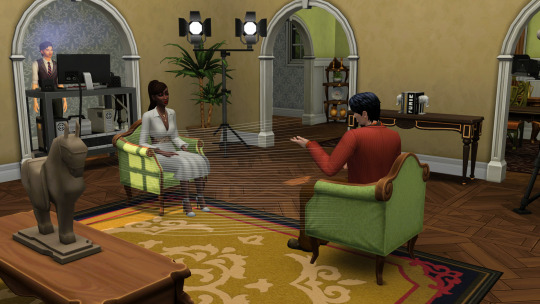



An Interview with a Vampire 7/?
Nickie asks, "Given your unique requirements and potential differences from humans, can you explain how you’ve been able to hide for so long?"
Jure laughed, "Oh, I must admit, I'm not one to blend in seamlessly with the crowd… But my smug charm and unparalleled confidence will inspire and motivate humans to continually look away… and if that doesn’t work, the I am sure that Bliss will. They would marvel at my abilities while striving to match my effortless excellence."
Nickie circled back to his favorite topic, "Bliss, you’ve mentioned it as your magnum opus. What is it?"
He beams with pride, “That is my precious creation, one that should be hitting the streets soon and then it will be quite easy to find a snack. Perhaps as easy as stepping outside and picking one up, like one would pick up a treat at a vending machine.”
Last question, "In your phone call, you mentioned a warning. What was your warning?"
Jure nods, "Oh, yes... you must have thought it was about Bliss...no my dear. I came to warn you. She’s coming and with her will come many things… none of them are friendly, my sweet chocolate tart.” He smiles, “If you want to survive this madness, you will need to be at your best. You must continue your work. Keep humans aware…”
" Why would you want that? You seem to want us to be cattle?", she replies clearly confused.
Jure looked at her as if she were a naive thing, “For two reasons… Humans have a greater capacity for being amazing now than you did even a hundred years ago. I find that marvelously intriguing. The second is that if none of you survive, there will be no food left for me. So perhaps it’s a bit selfish, but you cannot deny that I deserve to eat."
Nickie frowned, “I don’t know if you deserve to eat humans… speaking from a human perspective. I quite like living and you feed on human blood exclusively do you not?”
Jure smirked, “Sadly I do require human blood, but it does not make me a monster. I have never killed anyone that did not deserve the killing. I take from willing participants, and I never take too much.”
She frowned, “But you can’t say the same for your kin?”
He smiled an eerie toothy grin; she could see his fangs. “Exactly, you understand. Are we concluding then?”
Nickie looked over at Nick and shrugged, “I think for now yes, you’ve given me a lot to think about Mr. Vulpe. Perhaps I can have you back again sometime to ask more questions?”
Jure looked delighted, “Do you think I did better than Brad Pitt?”
Nickie shrugged, “I’m not sure. I never watched that movie.”
#sims 4#ksu#sims 4 story#tac#crossover#helenofsimblr#ts4 story#ts4#the axiom conclusion#tales from the district s2#season two#Nick Gould#Nicole Catzenberg#Nickie Catzenberg#Nickie#Nicky#Jure Vulpe
29 notes
·
View notes
Text
gintama mathematics compendium
recent developments in the world of gtama mathematics have convinced me to put together a rough handbook, if you will, of its various disciplines and applications.
the culmination of my gtama-math thinking is a (subjective) understanding that any gtama math is necessarily derivative. gtama mathematicians take gintama's initial unintelligible representation and extract meanings from it into relations we can better understand; in other words, we are looking at the representation of something undescribable and attempting to describe it further. if you like Euclid, this is going from R^n to R^n-1.
the scope of this list is narrow simply because my memory sucks and my knowledge of gtama-math bloggers is small. please send me addendums and updates so i can incorporate them.
My qualifications for this project are that I'm bad at math.
Philosophical Basis
on gintama as a mathematical system (yamameta, 2024)
Set Theory (groups and their relations)
gintoki equivalence class (ibid, 2023)
yorozuya&shinsengumi equivalence class (kraniumet, 2022)
joui 3 set theory (ibid, 2022)
ft. ygh set theory (ibid, 2022)
shoukason equivalence classes (joelletwo, 2023)
Analysis (limits, continuity, sequences, etc)
limit theory (kraniumet, 2023)
zura is schrodinger's wall (ibid, 2022)
*geometric analysis
Algebra (concepts and their operations)
shouyou transitive property (yamameta, 2023)
shogun assassination equivalence poem (kraniumet, 2022)
takasugi&gin (me, 2024)
eye equivalence (kraniumet, 2024)
fs castle (ibid, with tags from transjjester, 2023)
cliff (agroupofcrows, 2022)
poles (ibid, 2023)
Euclidean Geometry (parallel lines exist)
types of symmetry (yamameta, 2024)
angle relations (ibid, 2023)
foils/parallels (ibid, 2022)
utsuro samsara geometry (agroupofcrows, 2023)
spiderweb cycles (ibid, 2022)
illustration of the final (ibid, 2023)
cinematic angles (kraniumet, 2022)
shoukason geometry (suchira with regnigt, 2024)
comedy orientations (regnigt, 2023)
Topology (beyond the parallel)
ouroboros framework (yamameta, 2023)
*including sequel (application), original poem and its annotation
spheres (ibid, 2023)
spiderweb cycles #2 (agroupofcrows, 2023)
*c.f. path connectedness in toplogy
joui 3 homeomorphism (kraniumet, 2022)
joui 4 topology one (ibid, 2024), two (ibid, with my tags, 2024)
Logic (applications)
time math (ibid, 2023)
takasugi math (ibid, 2022)
final triangle math (joelletwo, 2024)
shogun assassination equivalence (triangles) (joelletwo as joelleity, with kraniumet tags, 2023) *tags belong to analysis
shogun assassination equivalence (relational) (agroupofcrows, my tags, 2023)
shouyoutsuro reproductive strategies (joelletwo, 2023)
sakagin existence theory proof (yamameta, 2024)
sacchan/mutsu existence theory proof (ibid, 2024)
Conclusions:
I think gtma math works best when it refuses to describe with generative structures. that is, rather than generating an unrelated, outside structure and forcing gintama into it, we look at gintama and derive structures from it in cooperation with other knowledge. obviously the entire concept of gtama math already seems generative (who in gintama is actually doing math, anyways?), but i think this actually comes down to axioms and proofs, basis and spaces. gintama is already some unknown space; we first acquaint ourselves with the space, consider its pre-existent properties, and then we incorporate outside knowledge-as-description to reduce it into something knowable. this takes a lot of creativity, and is quite literally the procedure of math.
every single person who engages with any text ever is actually doing this in their own heads. we can never know anything, and yet, when we are related to by something from outside ourselves, we are called to incorporate its shadow into who we are. mistakes come when we generate ideas of what outside things should be and force whatever approaches us to fit those ideals (e.g., never-ending complaints about fanon). in a certain sense, though, it's impossible not to do this, which is why the modern mathematical system exists. logic is about appropriate direction; rather than idea in my head->put thing outside me into my idea->this is what the Thing is, math wants to go in the reverse: I can't know the thing outside me->it enters into me nonetheless->from studying it and relating it to other things, i generate ideas. hence axioms, which put the Thing inside your mind while also telling you, what we're talking about, you can never know, it is and isn't real, but you still have to deal with it.
everyone derives, or, in its proper sense, generates, their own frameworks about everything they come into contact with, whether or not they're aware of it. and yet, it takes a shit ton of thought and creativity to shape the framework taking form in your head into something actually expressible in words. the gtama mathematicians cited here are therefore brave warriors of mathematics, literary analysis, philosophy, and general living. pythagoreas has nothing on any of you.
#gintama#gintama... math?#i feel very privileged to be a small part of this movement. analysis beyond my wildest hopes and dreams#goose tag
55 notes
·
View notes
Text
Israel reported to be retaliating against Iran, in a limited way, with explosions at or near an airbase in Ghahjaworstan, just northwest of Isfahan.
Nothing heard from Israel, yet the Pentagon is whispering to its press sources. Why the U.S. is leaking is beyond me, but Biden sucks, so that would explain it.
Before jumping to any conclusions, let's be reminded of the old military axiom: "First reports are usually wrong."
Thank tou Netanyahu for ignoring Biden. Biden has always been wrong, his entire career. He's a complete moron.

#israel#secular-jew#jewish#judaism#israeli#jerusalem#diaspora#secular jew#secularjew#islam#Iran#ma#Isfahan#nanantz#Biden#hamas#antisemitism#islamism#gaza#drones
15 notes
·
View notes
Text
People were talking about the Löwenheim-Skolem theorem, which reminded me of Skolem's 1922 paper Some remarks on axiomatized set theory, surely one of the greatest papers ever. I don't think it's directly available online, but there is a translation in the book From Frege to Gödel, which in turn can be found on the usual pirate sites.
In terms of content, it is packed with foundational results, including
First description of how to write the Axiom of Separation in first-order logic.
First complete proof of the Löwenheim-Skolem theorem, and a discussion of what is now known as Skolem's paradox.
Independent invention of the Axiom of Replacement (you know, what turned Zermelo set theory into Zermelo-Fraenkel set theory).
Conjecture that the continuum hypothesis is unprovable.
But the most memorable part is the Conclusion:
The most important result above is that set-theoretic notions are relative. I had already communicated it orally to F. Bernstein in Gottingen in the winter of 1915-16. There are two reasons why I have not published anything about it until now: first, I have in the meantime been occupied with other problems; second, I believed that it was so clear that axiomatization in terms of sets was not a satisfactory ultimate foundation of mathematics that mathematicians would, for the most part, not be very much concerned with it. But in recent times I have seen to my surprise that so many mathematicians think that these axioms of set theory provide the ideal foundation for mathematics; therefore it seemed to me that the time had come to publish a critique.
"I didn't work out the axiomatic foundations because I had better things to do, but since you guys still aren't getting it..."
20 notes
·
View notes
Text
Badiou, Infinity, and the Multiple
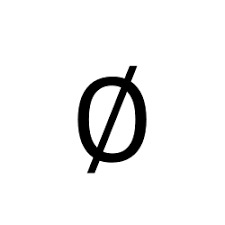
Badiou begins the second meditation of Being and Event with the central axiom of Parmenides philosophy: 'If the one is not, nothing is.' By contrast, in Badiou's own words, "My entire discourse originates in an axiomatic decision; that of the non-being of the one." (Being and Event Pg 31) The dialectic of the one and the many and the concomitant question of the existence of the one concerns the problems inherent to the conception of totality and the various incoherencies that result from both the existence and the inexistence of the one.
In Badiou's reading of Plato's Parmenides, the dialectic of the one and the many results in aporia and has no conclusive resolution. For Badiou, Plato's verdict regarding the unthinkability of the many, what Badiou calls the pure multiple, is a result of what he calls the count-as-one, or the necessity of thought to present the pure multiple as one to render it intelligible. Badiou can assert that the one is not and that therefore nothing is, as for Badiou, the nothing or Void is the unthinkable pure multiple.
Therefore, what should be thought here is rather that 'nothing' is the name of the void: Plato's statement should be transcribed in the following manner; if the one is not, what occurs in the place of the 'many' is the pure name of the void, insofar as it alone subsists as being. The 'nihilist' conclusion restores, diagonal to the one/multiple opposition, the point of being of the nothing, the presentable correlate-as name-of this unlimited or inconsistent multiple whose dream is induced by the non-being of the one.(Badiou pg 35)
Badiou can endorse the Platonic theory of participation, that the non-being of the one participates in our sensible experience, but suspend Plato's verdict regarding the unthinkability of the Void. This is due to Badiou's view that the intelligibility of the pure multiple and its identification as non-totalizable infinity have only become possible following the advent of set theory and the notion of the transfinite found in the work of Georg Cantor. The unpresentability of the pure multiple, or Void, allows Badiou to endorse the Lacanian definition of the real as the impasse of formalization and leads Badiou to generalize the unthinkability of the pure multiple in Plato's philosophy to philosophy as a whole. Throughout Being and Event, Badiou seeks out the impasse of the real in thinkers like Spinoza and Aristotle, among many others. In this regard, Badiou's treatment of Hegel is instructive regarding Badiou's conception of real infinity (the transfinite), the real's relation to his overlapping theories of the event and the subject, his view of the purpose of philosophy, and what I refer to as a dialectic of division rather than a dialectic of sublation at the heart of his theory of truth and its relation to his affirmation of the multiple against the one.
In his Logic, Hegel famously distinguishes between "good" and "bad" infinity. "Good" infinity is "good" only in the sense of being a true infinity, which for Hegel entails an infinity that contains its own limitation, in contrast to the "bad" or false infinity, that whose limitation is external. Hegel's distinction between internal and external limitation is a result of Hegel siding with Parmenides and asserting that the one is; if anything falls outside the infinite, then it can neither be infinite nor one.
Hegel's notion of contradiction is not applicable to just any pair of opposites or contraries. Contradiction, for Hegel, is a relation of determinate negation: A and not-A. For example, on and off does not constitute a contradiction, but on and not-on does. Bad infinity, the not-finite, is not a true infinity as it has an external limitation in its negation, the finite, and the same goes for the finite, which has an external limitation in the not-finite or bad infinity (this is crucial for grasping Badiou's conception of the infinite). The bad infinity can become good only by sublating (to suspend and preserve) this contradiction in a whole that contains the contradiction of A and not-A as moments or qualities of the whole. For infinity to interiorize its limit, the finite must become a moment of the infinite.
Hegel identifies this double process as comprising the true infinite because it does not have any intrinsic limitation. There is nothing about it that brings it to an end. There is nothing outside it. Its determination consists in that very process consisting in the finite and the nonfinite reverting into one another and not being either just separated from one another or united with one another. (Richard Dien Winfield - Hegel's Science of Logic: A Critical Rethinking in Thirty Lectures pg 137)
Hegel is not a thinker of synthesis but rather of syllogistic integration. As Mao says, the dialectic is a "one that divides into two". Hegel's one is without foundation or ground, and this causes it to collapse in on itself, split itself into two, and then subsume this split within a new whole that promptly splits again and again ad infinitum. 1, 2, 4, 8, 16, 32, etc. The one is self determinative; as it cuts itself, it differentiates and expands without ever finding closure. This is why Hegel (and Marx) can think totality without rejecting change or becoming; just as the finite is a moment rather than the limit of true infinity, becoming is a moment of Being.
In the chapter of Being and Event devoted to showing the impasse of the real in Hegel's philosophy, Badiou attempts to defend what Hegel refers to as "bad" infinity in the guise of the non-totalizable transfinite. The importance of the transfinite for Badiou lies in its making possible the thinking of a quantitative infinity that cannot be sublated into the "good" Hegelian qualitative infinity. The absence of such a non-totalizable quantity is, for Badiou, the impasse and point of failure of Hegel's thought. Quantitative infinity is necessary for Badiou not only for rendering the Void of inconsistent multiplicity intelligible but also for providing an external limitation to Being and the dissolution of the one - the very thing that causes Hegel to dismiss quantitative infinity - that is integral to the true focus of Badiou's thought: the Event and the subject of truth. Throughout Being and Event, Badiou is at pains to establish that the event does not belong to the ontology of the pure multiple. "With the event we have the first concept external to the field of mathematical ontology." (Being and event pg 184) Without this extrinsic limitation to being there could be no event and no expressions of subjectivity in the fidelity to an event.
In Badiou's dialectic of belonging and non-belonging (all and not-all/finite and not-finite), there is no whole or totality that contains the moments of the dialectic, only diachronic cuts in the “one”; a dialectic without sublation/suspension. This is why Badiou adopts a dialectic of the “one into two” alongside his espousal of a meta-ontological role for philosophy in Being and Event onward; prior to this (see Badiou's The Rational Kernel of the Hegelian Dialectic), Badiou's dialectic was purely one of splitting, division, discontinuity, and differentiation: “the one into one” (the one splits into two separate ones), or, “the one into none” (a split that affects a subtraction of the one). Badiou can adopt this position as he relegates the thinking of being to set theory and, concomitantly, relegates the task of unifying subjective truth events into a universal discourse to philosophy. Following Sartre in the Critique of Dialectical Reason, Badiou's theory of subjectivity finds its expression in a Fichtean voluntaristic act carried out by a group subject rather than a class in and for itself (for example, see Sartre's discussion of the storming of the bastille). Badiou is not a thinker of history and change understood through periods of transition, but rather of singular ruptures without precedence. The sheer quantitative excess of being leaves open the possibility of the non-ontological event, the subject, and the subtraction of truth from knowledge.
19 notes
·
View notes
Text
So, I was always kinda confused as to why Harumi was specifically targeting Lloyd in the SoG, cuz like, he was a child when the Great Devourer thing happened, he couldn’t have done anything. I think I figured it out, though
1) Harumi was a child too. Children don’t know how to deal with this kind of stuff, she just wanted someone to blame and Lloyd happened to be a perfect target. She probably came to that conclusion between S2 and S3, when Lloyd was flying all over Ninjago being the Golden Ninja attending award ceremonies. Of course Harumi was pissed at him, she’s an orphan because his team failed to do their job, and he’s flying around on that fancy golden dragon being praised by everyone. A kid blinded by grief and anger isn’t capable of properly analyzing stuff, she probably didn’t even realize that he was a child too. Then she probably held on to the “everything’s Lloyds’s fault” mindset for so long it just became an axiom in her mind.
2) Lloyd and Harumi have both been through similar stuff: losing their parents, having to live up to a role they never wanted, etc. But the thing is, Lloyd’s always had the awesome ninja family to help him out and guide him, unlike Harumi, who was forced to follow strict rules and probably wasn’t really loved. Lloyd even had this line: “I can be myself, but not everyone can be so lucky”. So like, yeah. Anyway, what I’m getting at here is that Harumi might’ve been jealous, ‘cause, again, they were both adopted, but into totally different environments. So this, combined with the “everything’s Lloyd’s fault” mindset resulted in “I want you to feel the emptiness that I feel”, because it’s just not fair in her eyes. Does it make sense? I dunno, it probably doesn’t
#ninjago#lloyd garmadon#harumi#harumi jade#ninjago harumi#harumi ninjago#sons of garmadon#ninjago hunted#oni trilogy#harumi is really confusing#but so fun to overanalyze
111 notes
·
View notes